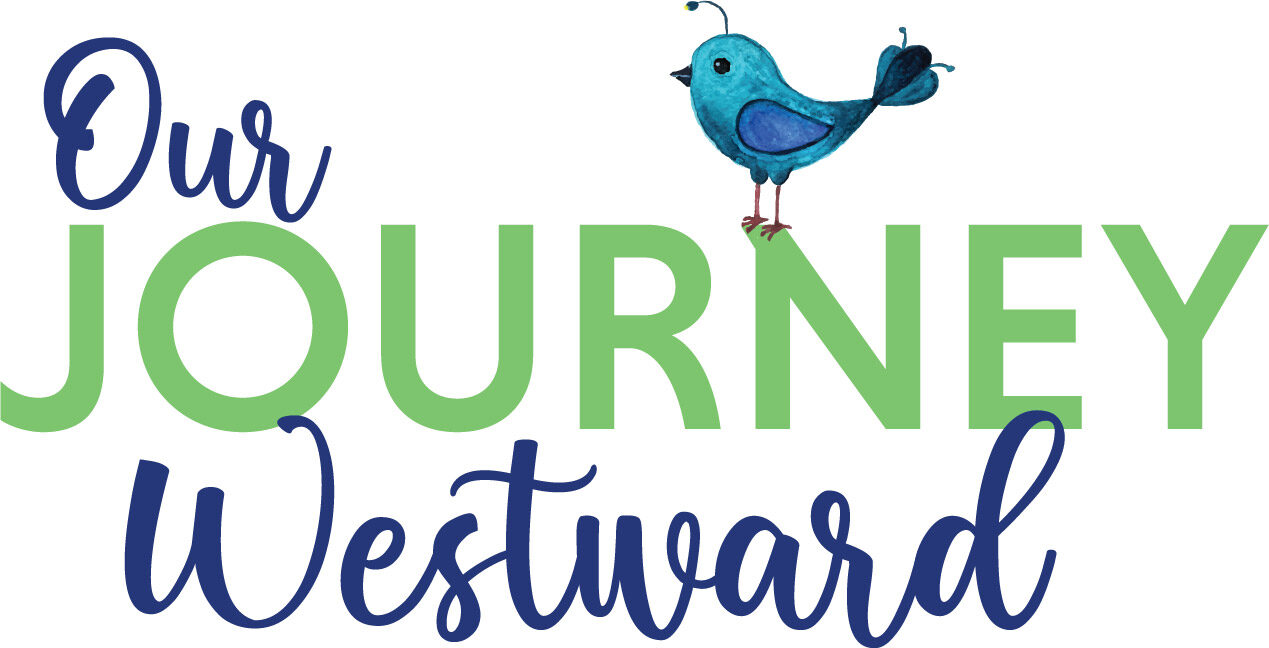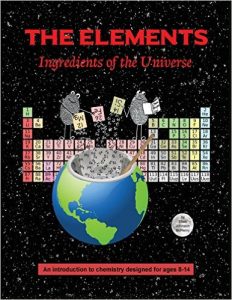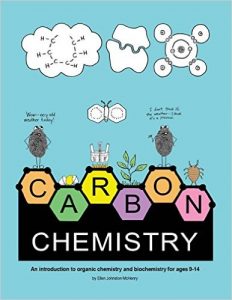How to Teach Out-of-the-Box Homeschool High School Chemistry
We veered off the “typical homeschool path” this year to teach out-of-the-box homeschool high school chemistry instead.
This isn’t the first time we’ve chosen a different path for our son, who is a smart kid but doesn’t thrive in the textbook world of science. Do you remember how we chose an out-of-the-box biology course last year? Because that course worked out so well, it was just natural to continue with a similar plan for chemistry this year. And, it worked again!

This post contains affiliate links.
Background Info
Our oldest went the typical homeschool route of Apologia Chemistry during high school. It’s an excellent course that provides a thorough and well-practiced chemistry education. It also does a great job teaching the mathematics of chemistry. I would recommend this program to anyone wanting a solid, rigorous chemistry course for their homeschooler.
However, my daughter – who never balked me on much of anything in her homeschool career – literally cried day in and day out over the lessons. We bought the teaching DVD’s, yet she still struggled. We joined a co-op class full of other students taking the same course, yet she still struggled.
In the end, most of the issues seemed to be with the math. She was a very decent math student, but something about the mathematics of chemistry was a stopper.
I later learned that Apologia Chemistry may be a bit too rigorous for the student who is less math-minded.
Should we just ditch chemistry?
Is chemistry something you just give up for those less math-minded kids? No way!
It’s still a VERY important subject because it helps explain all the other sciences. After all, chemistry is atoms, molecules, matter. It’s properties, interactions, changes. It’s in things as complicated as understanding diseases or manufacturing gasoline, and as simple as baking a cake or creating your own cleaning supplies. It is in everything and is everything. Chemistry is important!
And, you know how I feel about the obligation we have to take homeschooling seriously. Even chemistry.
Out-of-the-Box Homeschool High School Chemistry
The non-traditional, year-long course we designed for my son was full of several great (and relatively inexpensive) resources that provided a thorough overview of general chemistry.
Semester One: Part 1
Since it had been several years since my son had taken chemistry in middle school, we started the year off with a quick and easy review using The Elements: Ingredients of the Universe. Like most of Ellen McHenry’s curriculum, this book could be used with students younger than high school. That doesn’t mean it’s not appropriate for high school, though. Especially if it’s just one part of a meaty line-up.
Here’s what the author says herself…
“Can this curriculum be used for high school? Yes and no. It can’t be used as an actual high school chemistry curriculum. It does not go into the quantitative (mathematical) side of chemistry. There’s no balancing equations or stoichiometry. However, it does go into many topics that are, indeed, a part of high school chemistry. If you have a student who is afraid of chemistry, and who doesn’t mind having cartoon characters in the text…then this might be a wonderful and fun introduction to chemistry for them. They will gain a very solid understanding of atoms, molecular bonding, and the structure of the Table, which are the rock-bottom basics upon which the rest of chemistry is built. You could definitely use this for the first 6-8 weeks of a high schooler’s curriculum. (Many of the activities, such as the “Quick and Easy Atomizer” and the “Periodic Table Game” would be just fine for high schoolers.)”
This book contains 8 chapters that we breezed through in about four-weeks. It was a great refresher!
Semester One: Part 2

Chemistry 101: An Overview of God’s Chemical World is a DVD program that makes a great starting point for a chemistry course. Nineteen 20-45 minute lessons go through the history of chemistry; the future of chemistry; the periodic table and characteristics of the elements and their groupings; the make-up of atoms, molecules, and compounds; and some instruction on balancing equations.
We went through this pretty quickly, watching an average of two lessons/week. One day he would view the lesson and take notes. The next day he would review notes printed from a PDF file (included) and take the accompanying quiz.
There were discussion questions, labs, research ideas and other suggestions available if I wanted to stretch out the curriculum for an entire semester – or even a year. However, other great curriculum awaited us, so we finished this entire course in about 10-weeks.
(Note: Even if you follow every single suggestion provided for using this course as a full-year chemistry credit, I still think your students need some extra instruction in the mathematics of chemistry. See what we did below.)
Semester One: Part 3
The last four weeks of the first semester were spent playing around with some high school level chemistry experiments. Most of the experiments came from A Guide to High School Chemistry Experiments.
Semester Two: Part 1
Like the first semester, our second semester started off with an Ellen McHenry book. Carbon Chemistry is recommended for 6th-10th graders, however, I think using it with most middle school students would be a stretch. While it’s written in easy-to-understand language with plenty of diagrams, the concepts are still pretty big.
The worksheets that follow each chapter probably aren’t quite as in-depth as a high school student should go. But, they do reiterate the terminology and expect comprehension of the material.
As with all McHenry’s books, there are several wonderful hands-on activities and experiments that go-along with each chapter to really reinforce the concepts. These are optional, but worth it.
Each of the 11 chapters took us about a week to go through. After a basic understanding of the carbon atom and its allotropes, we jumped into carbon’s role in -anes, -enes, and -ynes. We learned about functional groups, plastics, rubbers, carbohydrates, fats, and proteins. In the end, everything was tied together as we learned about the carbon cycle.
This book was fascinating!
Semester Two: Part 2
As I mentioned above, we didn’t completely kick the mathematics of chemistry to the curb! I think it’s important to at least have a basic understanding of how math and chemistry are related. Using the various resource sites, the final 7-weeks of our school year were spent reviewing and/or learning how to calculate:
- scientific notation and significant figures
- ratios and proportions
- unit conversions
- percent yield and percent error
- statistics
These online resources were perfect for reviewing and teaching the basic mathematics of chemistry. Of course, YouTube came to the rescue a few times when we needed a bit of extra teaching on a concept. Oh, the joys technology brings to this homeschool momma some days!
ChemTutor Numbers and Math Operations
Khan Academy Crash Course Chemistry
Is this homeschool high school chemistry enough?
As we head toward the finish line of our school year and I see how much chemistry my son “gets,” I don’t at all regret taking a non-traditional high school chemistry path! I’ve seen him make real-world connections and we’ve had several conversations around the dinner table about various elements, molecules, scientists, carbon chains…
You might wonder if this course will transition easily into college chemistry down the road. At this point, I can’t answer that. I know that after searching long and hard for high school chemistry scope and sequences, I don’t think this piecemeal approach seems to lack too much as far as an introduction of topics is concerned. It probably does lack in cohesive teaching of mathematics alongside the chemistry topics.
But, as I searched for topics covered in college level general chemistry, I feel pretty confident that high school and college level general chemistry courses are fairly similar overall. Meaning, even if I’ve left some holes this time around, I don’t think my son will be completely left behind in a college class.
What has your homeschool high school chemistry looked like?
Related Posts:






this could not have come at a better time!
This looks wonderful. Thanks for sharing. As a student who struggled to pass public high school chemistry and then aced college chem, I’d say you’ve done a great service towards helping your son make connections. Should he take college chemistry, chances are very high he will succeed. May you be blessed for your “out of the box efforts” and more so for sharing what worked!
Amy, I really appreciate you sharing your experience (and the encouragement!) 🙂
Thanks so much for this information. I have a son who will probably “do” chemistry next year and I was thinking he needed a class in order to learn chemistry properly. Even though he’s fascinated by it, has read practically everything he can get his hands on about chemistry, and even has his own element collection, I think somehow it isn’t enough! But now reading about what you did, I realize that trying to find a scope and sequence somewhere myself, talking to a PhD friend who now teaches high school science, and making sure he gets the math that goes along with it all will work. Will better than work, even. He’ll know a lot and be well prepared for whatever next steps he takes. Thanks again for the glimpse into your world and the encouragement!
Tiffany, I’m always SO excited to hear about kids who love something so much that using a textbook almost seems like it would ruin the great learning that’s already in place. 🙂
Hi Tiffany,
I taught chemistry in public high school for several years and now I have a chemistry blog http://www.chemsimplybysunny.com to help students struggling to make it through their chemistry courses. I love how you have put together your own course for chemistry. and I love that you didn’t give up on it. I agree with your statement of how chemistry is not a science to give up on because it helps lay the foundation for so many other parts of science. Thank you for your thoughtful and informative post.
Thanks for sharing your blog, Sunny!
Hi – If anyone is looking for an alternative to this our family used https://Chemexplained.com . It worked for our 3 children and they sailed thru their chemistry class in college because they were prepared . The difference is Chemexplained provided the teacher using teaching podcasts! Check it out!
I was wondering if there was an update to this post? Did your son end up taking college chemistry and, if so, how did he do?
I’m working on planning for Rachel for next year — I know this is an older post, but can you comment about what things looked like down the road?
Did your son end up taking sciences in college?
If you have a kiddo who expects to take much science in college, this plan may not be enough since it’s light on the math. However, if you’re pretty sure the college plan won’t be STEM oriented, this has been enough in our experience. I’ve graduated two from college without any problems. Neither of them went into a STEM field and didn’t struggle with the basic sciences they took.
Fascinating! This is really helpful! I’m deciding on what to do for my sophomore daughter next year who has to choose between ASL and Apologia Chemistry for her first block at a co op, and so I’m looking at all her options. She is going to be going into some form of art for a degree, and chemistry really is great for art. But I’m wondering how you put this on your child’s transcript? As a lab science, how many credits etc. I’m still trying to understand all of that. We homeschool in WA state:)
Thanks soooo much!
Cindy, did you use all the games and activities in the Elements book while doing it for high school?
Not all of them, Keri. My son wasn’t a big hands-on kid, so we only did the most helpful activities that seemed to make a difference in understanding. 🙂